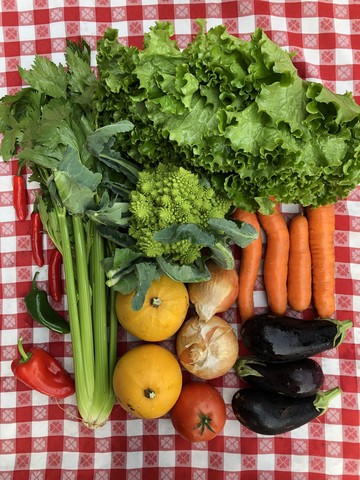- Carrots
- Eggplant - probably the last of the season
- Celery - first of the season! Celery is not our strongest suit - never as juicy and mild and peanut-butter-ready as the store-bought stuff - but it's packed with flavor for soups and sautees. Celery take an inordinant amout of water to grow - more than twice as much as any other crop on the farm - and even so it doesn't always get as big and succulent as I'd like.
- Lettuce
- Yellow Onion
- Sweet Pepper
- Tomatoes - on the wane as the light fades
- Hot Peppers
- Spaghetti Squash - We're kicking off our fall winter squash season with a spaghetti squash variety that's new to us this year: Small Wonder. Aptly named because one row yielded 3 times more spaghetti squash than we've ever harvested from that amount of space. AND, they're cute little things - not quite as intimidating as some of the clunkers we've given out before. Spaghetti squash really is spaghetti-like inside: long strings of sweet yellow flesh that hold up as a fantastic noodle substitute. In the food world they've recently garnered some newfound prestige as a gluten-free marvel in the kitchen. From this point on you'll get a different winter squash in your share each week. If you don't already have a go-to way of cooking winter squash, here's a great collection of recipes from savory to sweet to use as inspiration: https://www.epicurious.com/ingredients/acorn-delicata-kabocha-spaghetti-.... Included is a yummy recipe for turkey chili atop spaghetti squash for this week. Always be careful when cutting into winter squash. They're hard-shelled and round, which makes it all-too easy to send a knife through your hand instead of the squash. A couple tips:
- If you're cutting a raw squash in half, use a sharp-tipped, heavy-bladed chef's knife. Drive the tip of the knife into the squash first and work it around the waist of the squash so that it can't slip and maul you.
- If you have the time to pre-bake your whole squash just enough to soften it up, that makes cutting into them a lot easier and safer. You can also pop a squah into the microwave for a few minutes to pre-soften. Be sure to poke a few holes in it first so it doesn't explode.
On Rotation:
- Romanesco Cauliflower
- Broccoli
October: It's All About Winter Cover Crops
This week our to-do list is almost entirely organized around one priority: getting as much of our fields seeded to winter cover crops as possible before the rain this weekend. Cover cropping is the most important thing we do on the farm all year: planting seeds whose sole purpose is to protect and nourish our soil through the winter and early spring. We usually grow a mix of cereal rye or tritcale, oats, red clover, field peas and/or vetch. Which cover crops get seeded where is largely dictated by what cash crops will follow the next season in our extensive rotation, but the goal is always to grow a diversified mix that will add lots of organic matter and contribute some nitrogen when it gets mowed down and incorporated into the fields next spring. It's work I love because it's all about giving back to our soil after it's offered up so much all summer, and it's work I get to do primarily with the horses. With well-timed rains, we'll start to see a tranformation from brown to fuzzy green as millions of seeds germinate in our bare ground and reach for the sky. By next spring, many of these cover crops will be as tall as me, rife with beneficial insects finding nectar in the flowering blossoms of clover, vetch and peas and helping them survive the nectar-lean months of early spring. And I promise you, when the time comes to mow them down in March and April, I will be loathe to do it because they are so beautiful, humming with the life of small things that make the world go 'round.

